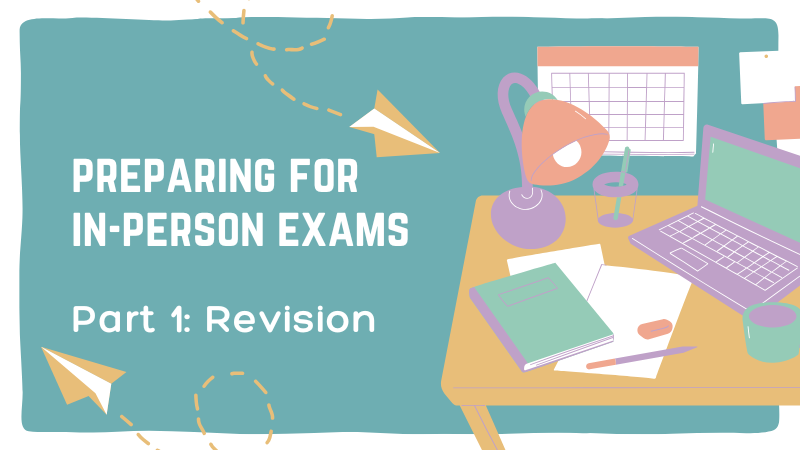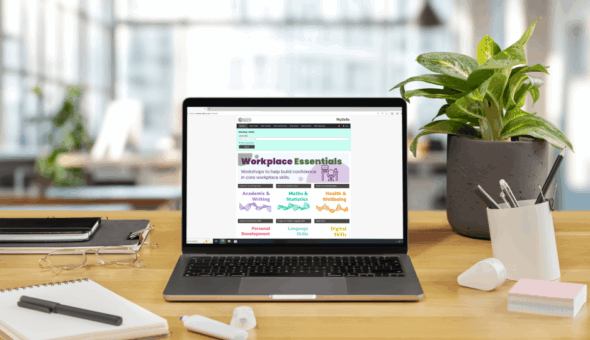It’s normal to feel nervous about in-person exams, but the right approach to revision can go a long way towards helping you feel more confident.
1: Gather all the necessary information
Anxiety often arises from uncertainty, so before you get started, make sure you have all the practical information you need about each exam. For example:
- When is each exam and how long is it?
- What is your room and seat number?
- Can you take in notes?
- Will you need to use a laptop or write by hand?
- What can and can’t you have with you at your desk?
- What if you need to go to the bathroom?
- What types of questions will you have to answer and how long should your answers be?
- What about references?
You’ll find the details of your specific exams on SAMIS and general exam information on the Exams and assessments webpage. For questions relating to your course or unit, check the information you’ve been given by your tutors and if in doubt, ask.
Write everything down so that you can refer to it later. Then you can put any practical worries aside and focus on revising.
2: Be strategic about how you revise
As well as clarifying what to revise, think carefully about how you’ll do it. Some important things to consider are:
- The kinds of questions you'll need to answer (essays, short answers, multiple-choice, calculations)
- What your tutors are looking for in your answers
Make use of any information your tutors have given you, including looking at past papers if these are available for your subject, and ask if you’re unsure. Once you’re clear about what the exam will involve, you can figure out how best to prepare.
For an in-person exam, you’ll need to memorise a certain amount of information. Revising material at intervals, mixing up topics and testing yourself will all help your learning to stick. Your tutors aren’t expecting you to have learned every detail of every topic by heart; they want to see that you can apply, analyse and evaluate information and ideas, so don’t spend hours simply copying lecture notes. Expand and elaborate on them by applying theories to examples, brainstorming pros and cons, exploring different arguments, comparing, contrasting and making links. Creating concept maps, tables and other diagrams can be a good way to visualise these connections.
Building rich, interconnected knowledge structures in your mind will help ensure that the ideas start flowing when you open the exam paper.
3: Train like an athlete
Athletes prepare for big sporting events not just by thinking about what they’ll need to do but by actually doing it. Treat exam preparation this way and you’ll feel much more confident, especially if you’re worried about maintaining your focus or writing by hand.
Use past papers or devise your own exam questions. Then practise answering them in a fixed timeframe. Replicate exam conditions as closely as you can, by putting your digital devices away, using pen and paper, and working somewhere with low-level background noise.
This approach to revision may require a bit of effort, but it really pays off. For example, it helps you to:
- Train your brain to focus and filter out distractions
- Train your hand to write
- Consolidate and reinforce what you’ve learned
- Identify gaps in your knowledge
- Decide how to allocate your time during the exam
If you find this hard at first, start small and gradually build up to answering longer and more difficult questions.
Any effective training regime includes rest, sleep and a balanced diet, and the same is true of revision. Look after your wellbeing and you’ll feel much more positive and motivated. Your brain will function a lot better too.
4. Other revision strategies
Each person will have their own preferred approaches to revision, but make sure you find techniques that help you to grasp, consolidate, and retain the knowledge required for your programme. These could include:
- Flashcards: Summarise key concepts on small cards or using a flashcard app and use these as memory prompts. This can be a productive way to spend ‘dead’ time when you can’t do much else, for example, when travelling on a bus
- Memory aids: Using diagrams, mnemonics and memory hooks can help to remember specific facts. You could put them on post-it notes and stick them somewhere visible, such as around your room or house
- Past papers: Timed practice with past papers (available from the Library for some subjects) can help you understand what is expected of you in the exam and develop your exam technique. It's very useful to know the format of the exam and the weightings of the questions, but always check with your unit teacher for up-to-date information about your upcoming exam
- Group studying: Some students find it helpful to meet with friends to discuss work and test each other. If you're having difficulty understanding a concept, talking it through with a course mate may help
- Recording: Try recording yourself talking through your notes, and then listen back to it a few times to help you remember it
In addition you can talk to the teaching staff on your course. Your unit teacher(s) may run revision classes, offer individual guidance, or recommend helpful reading material.
5: Get the right support
There are lots of people in the University who can help you feel more confident about your exams.
- The Skills Centre's exam support includes exam-focused Skills for Success workshops and self-access resources
- The Academic Registry’s exams and assessments webpage contains information on rules and regulations, alternative arrangements and much more
- Student Support's Wellbeing Service is always available to help with anything that's bothering you
Never be afraid to ask for help or advice. It shows you can take the initiative to solve problems and identify the information you need – valuable skills for life after university.
While we can never guarantee the outcome of an exam, we can control what we do to prepare. With the right information, strategies, practice and support, you’re much more likely to succeed.
What’s more, you’ll be developing many of the skills and qualities that employers are looking for – time management, organisation, resilience and independent learning skills to name a few.
Other useful resources
For more tips on revising effectively, see:
Respond



